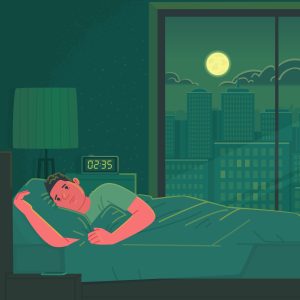Neuroscience illustrates the critical importance of sleep. The brain cells and neurons within the brain are able during sleep to carry out numerous functions during REM sleep that help the over functioning of the brain and body. Sleep plays pivotal roles helping the body recuperate as well as restore and rebuild memories from throughout the day. In addition, sleep helps promote growth and stimulates critical thinking. Hence when sleep is deprived or greatly reduced it weakens the entire human organism from thinking and reflexes to basic functions. In addition, it weakens the immune system opening one to various illnesses.

One other negative effect without sleep is the chance of depression. Due to impaired cognitive functioning, the brain is less able to cope with stressors and grief. Furthermore, neurotransmitters are weakened in their function, while the weakened immune system leads to one feeling less energized, prone to stress and its eventual consequences. The article, “Sleep Quality Is A Stronghold Against Depression and Anxiety” from Neuro Science News takes a closer look at how lack of quality sleep ties with depression and anxiety. The article states,
“Chronic stress is a major risk factor for a number of mental health disorders, including depression and pathological anxiety. Adaptive cognitive emotion regulation (CER) strategies (i.e. positively-focused thought processes) can help to prevent psychiatric disturbance when enduring unpleasant and stressful experiences, but little is known about the inter-individual factors that govern their success. Sleep plays an important role in mental health, and may moderate the effectiveness of adaptive CER strategies by maintaining the executive functions on which they rely”
“Sleep Quality Is A Stronghold Against Depression and Anxiety”. Neuro Science News. (2023). NeuroScienceNews.com
To read the entire article, please click here
Commentary
Sleep is an essential aspect of our well-being, playing a crucial role in maintaining our physical and mental health. We often underestimate the impact that sleep deprivation can have on our overall well-being, particularly on our mental health. Recent studies have shed light on the strong link between sleep and depression, revealing a vicious cycle where lack of sleep fuels the flames of depression. Understanding this connection is vital in addressing the silent struggles that many individuals face.
Understanding the effects of sleep deprivation on depression
Sleep deprivation is known to have detrimental effects on our mood and emotions, and this is especially true for individuals struggling with depression. When we don’t get enough sleep, our emotional regulation is compromised, leading to heightened levels of irritability, sadness, and anxiety. The lack of sleep disrupts the delicate balance of neurotransmitters in our brain, such as serotonin and dopamine, which play a vital role in regulating our mood. As a result, individuals who are sleep deprived are more prone to experiencing depressive symptoms and finding it difficult to cope with daily challenges.
Moreover, sleep deprivation also affects our ability to handle stress. When we are sleep deprived, our stress response becomes hyperactive, making it harder for us to manage and recover from stressful situations. This prolonged exposure to stress further exacerbates the symptoms of depression, creating a vicious cycle that can be difficult to break.
The impact of sleep deprivation on cognitive function
In addition to affecting mood and emotions, sleep deprivation also takes a toll on our cognitive function. Lack of sleep impairs our ability to concentrate, make decisions, and think clearly. It becomes harder to focus on tasks, leading to reduced productivity and performance. Sleep-deprived individuals often struggle with memory problems, finding it challenging to retain information and recall it when needed.

Furthermore, sleep deprivation affects our executive functions, which are responsible for planning, organizing, and problem-solving. When these functions are compromised, it becomes harder to navigate the challenges of daily life, leading to increased frustration and a sense of helplessness. These cognitive impairments can significantly impact our overall well-being and contribute to the development and persistence of depression.
Sleep deprivation and the risk of developing depression
While lack of sleep can exacerbate existing depression, it can also increase the risk of developing depression in individuals who are otherwise healthy. Sleep deprivation disrupts the delicate balance of neurotransmitters in the brain, which can trigger the onset of depressive symptoms. Chronic sleep deprivation also affects the regulation of stress hormones, such as cortisol, which further contributes to the development of depression.

Additionally, sleep deprivation weakens our immune system, leaving us more vulnerable to infections and illnesses. The physical toll that lack of sleep takes on our bodies can contribute to feelings of fatigue, low energy, and a general sense of malaise, all of which are common symptoms of depression. Therefore, prioritizing healthy sleep habits is crucial in reducing the risk of developing depression and maintaining good mental health.
Strategies for improving sleep quality
Improving sleep quality is essential in breaking the cycle of sleep deprivation and depression. Here are some strategies that can help:
Establish a consistent sleep schedule
Maintaining a regular sleep schedule is key in regulating our internal body clock. Going to bed and waking up at the same time every day, even on weekends, helps train our bodies to recognize when it’s time to sleep and when it’s time to wake up. This consistency promotes better sleep quality and overall well-being.
Create a sleep-friendly environment
Your bedroom should be a sanctuary for sleep. Make sure the room is dark, quiet, and at a comfortable temperature. Remove any distractions, such as electronic devices, and create a calming atmosphere that promotes relaxation.
Practice relaxation techniques before bed
Engaging in calming activities before bed can help signal to your body that it’s time to wind down. Try incorporating relaxation techniques such as deep breathing exercises, meditation, or gentle stretching into your bedtime routine. These practices can help reduce anxiety and promote better sleep.
Avoid stimulants and electronics before bed
Caffeine and electronic devices can interfere with your ability to fall asleep and stay asleep. Avoid consuming caffeine in the afternoon and evening, and limit your screen time before bed. The blue light emitted by electronic devices can disrupt your sleep-wake cycle, making it harder to fall asleep.
The role of sleep hygiene in managing depression
Sleep hygiene refers to the habits and practices that promote healthy sleep. It encompasses various aspects of our lifestyle and environment that can influence the quality of our sleep. For individuals struggling with depression, prioritizing good sleep hygiene can significantly contribute to their overall well-being.
Establish a bedtime routine
Having a consistent bedtime routine signals to your body that it’s time to wind down and prepare for sleep. Engaging in calming activities such as reading a book, taking a warm bath, or practicing relaxation techniques can help you relax and transition into sleep.
Create a sleep-friendly environment
As mentioned earlier, creating a sleep-friendly environment is crucial for quality sleep. Keep your bedroom cool, dark, and quiet. Invest in a comfortable mattress and pillows that support your body. Make your bedroom a peaceful and inviting space that promotes relaxation and restful sleep.
Limit daytime napping
While a short power nap can provide a temporary boost in energy, excessive daytime napping can disrupt your sleep-wake cycle. Limit daytime napping to 20-30 minutes and avoid napping too close to your regular bedtime.
Limit alcohol and nicotine consumption
Alcohol and nicotine can interfere with your sleep quality. While alcohol may make you feel drowsy initially, it disrupts your sleep cycle and can lead to fragmented and restless sleep. Nicotine, on the other hand, acts as a stimulant and can make it harder for you to fall asleep.
Seeking professional help for sleep-related issues and depression
If you’ve tried implementing healthy sleep habits and are still struggling with sleep-related issues and depression, it’s important to seek professional help. A healthcare provider or mental health professional can assess your symptoms, identify any underlying causes, and recommend appropriate treatment options.
They may recommend therapies such as cognitive-behavioral therapy for insomnia (CBT-I), which focuses on identifying and changing the thoughts and behaviors that contribute to sleep problems. Medications may also be prescribed to help regulate sleep and manage depressive symptoms.
Remember, reaching out for support is a sign of strength, and there are resources available to help you on your journey towards better sleep and improved mental health.
The importance of addressing sleep issues in mental health treatment
Addressing sleep issues should be an integral part of mental health treatment. Sleep deprivation can significantly impact the effectiveness of other therapeutic interventions and medications. By addressing sleep problems, healthcare providers can optimize the overall treatment plan for individuals struggling with depression.
Moreover, improving sleep quality can have a positive ripple effect on other areas of life. When we are well-rested, we have more energy, better cognitive function, and improved emotional regulation. This, in turn, can enhance our ability to engage in therapy, develop healthy coping mechanisms, and make positive lifestyle changes that support our mental well-being.
Conclusion: The importance of prioritizing sleep for mental well-being
In conclusion, the link between sleep and mental health is undeniable. Lack of sleep can fuel the flames of depression, exacerbating symptoms and making it harder to manage daily challenges. Understanding the effects of sleep deprivation on mood, emotions, and cognitive function is vital in addressing the silent struggles that many individuals face.

By prioritizing good sleep hygiene, seeking professional help when needed, and integrating sleep-focused interventions into mental health treatment, we can break the cycle of sleep deprivation and depression. Remember, a good night’s sleep is not just a luxury; it is an essential investment in our mental well-being. Let us prioritize sleep and take the necessary steps to nurture our minds and bodies for optimal mental health.
Additional Resources
“The Link Between Sleep and Depression”. Krouse, L. (2023). VeryWellHealth. Access here
“Sleep and Depression”. Fulghum Bruce, D. (2022). WebMD. Access here
“Depression and Sleep: Understanding the Connection”. John Hopkins Medicine. Access here
“Depression and Sleep: What’s the Connection?”. JeWell, T. (2019). Healthline. Access here
